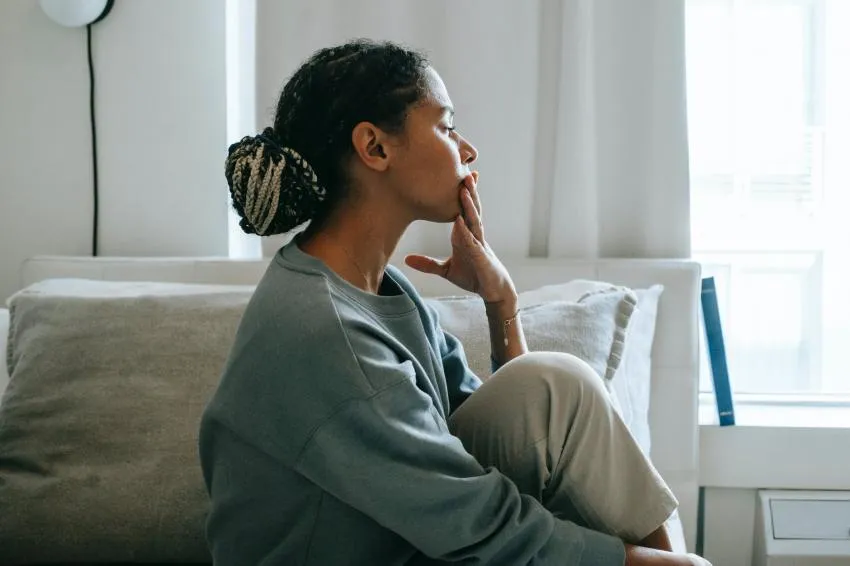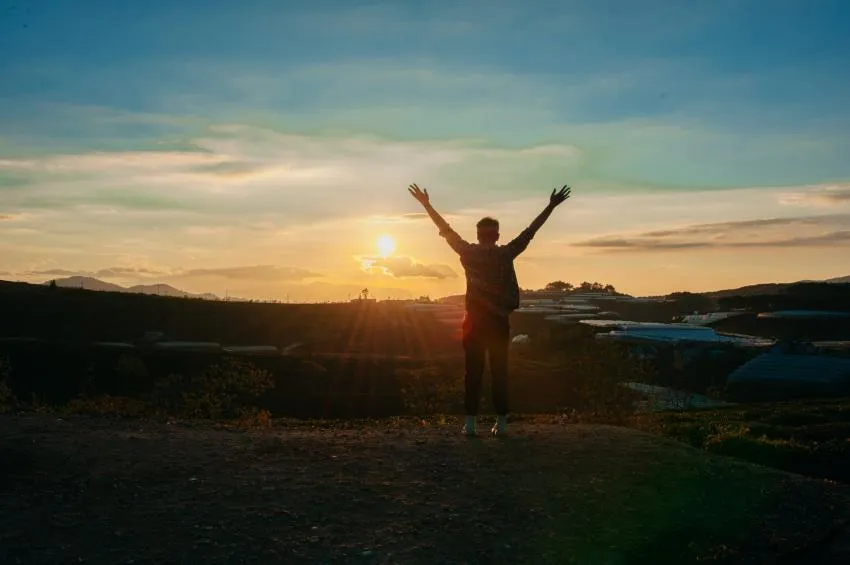Healing After A Toxic Relationship
First of all, I hope you've never had to suffer through any kind of toxic relationship, whether it be romantic or familial. However, if you have, I'm sorry and I'm here for you. I understand the damage it leaves behind.
If you don't know what a toxic relationship is, feel free to check out my other article related to toxic relationships titled "Why Twilight's Bella And Edward Are NOT #CoupleGoals." I go more in-depth about what a toxic relationship is, some examples within the popular movie Twilight, and what kind of expectations to have for your partner.
My Toxic Relationship Story
It was my first long-term relationship; I spent a little over a year being with someone who had struggles of their own, who was unhealthy for me. Everyone else knew he wasn't a good choice for me, but I, being oblivious to the unhealthy traits he had, stuck it out.
Our relationship lasted through our senior year of high school until the few couple months of going to separate colleges. Classic, right?
He had a drinking problem and I never realized it until someone pointed it out to me. When he was drunk, he would flirt with my friends. Most of the time, I felt like he wasn't as invested in the relationship as I was.
He chose not to talk to me for an entire week and didn't even tell me why until after the week passed. Apparently, it was part of the membership process when he was joining a fraternity.
He frequently expressed how he wanted to have sexual relations with me, even though I was waiting until marriage. Unfortunately, I didn't want to disappoint him or make him unhappy in any way so I finally gave him consent. I gave my entire being to someone who didn't respect me.
That relationship caused me to develop trust issues, relationship anxiety, a people-pleaser mentality, not care about what I want as much as I should, and more issues.
It took at least a year to heal from that relationship, and I suppose I'm still healing. I don't want others to feel how I did. That's why I'm writing this article, to help someone in any way I can so that they don't have to hurt for so long.

Here are some steps you can take to help you heal after a toxic relationship:
1. Feel Your Feels
You've just been through so much pain and stress. Take the time to let it all out. Curl up into a ball and cry, scream into a pillow, put on your boxing gloves and whack a punching bag, do whatever you need to purge yourself of all the negative emotions.
Your emotions are valid and supposed to be felt. Bottling them all up is an unhealthy coping mechanism. When it becomes unbearable, the bottle will shatter at the worst time. Give yourself the freedom to feel your feels.

2. Breathe and release the heartache
After you released every emotion you've ever felt from the toxic relationship, you need to experience peace and calm. Find a quiet place to be alone. After you rein in your thoughts, wait a few more seconds in the silence.
Deep breath in.
Let it out.
Deep breath in.
Let it out.
Take as many breaths as you want. Find a rhythm to it until you're not thinking about it anymore. If it helps, picture yourself in a peaceful happy place as you do your breathing. Let the peace enter your body and exhale the negative energy. You'll feel better.

3. Identify the Toxic Traits
Now that you've taken the time to decompress, you can start analyzing the toxic behaviors exhibited by the toxic person.
Here are some unhealthy behaviors that may indicate a toxic relationship:
Controlling Tendencies
One example of this is if your partner doesn't let you hang out with specific friends or family members because they "don't like them." They're controlling your actions, what you want to do, and that's not okay.
Dishonesty
It bothers me when people consistently lie, especially about insignificant matters. In my toxic relationship, I watched my boyfriend lie to his parents all the time. Observing that behavior made me worry if he's been lying to me about anything or about everything all the time.
Terrible Communication
I've had friends tell me that if their partner was upset with them, the partner would blatantly ignore my friends for the rest of the day or even a couple of days. Communication is key to a healthy relationship. If your partner chooses not to communicate, they don't care enough.
No Support
Similar to the previous trait, if you feel like you can't depend on your partner for emotional or physical support, that's a red flag. I felt very alone whenever I was going through an emotional hurdle during my first few weeks of college, even though I had my boyfriend to rely on. That tells you something about the relationship.
There are all kinds of signs that could hint at a toxic relationship. If you're aware of these signs, you're way less likely to get hurt the same way again.

4. Let go of the malice you hold in your heart
I'm not saying you should forget everything that happened to you because that's counterproductive. There's no personal growth when you push away all the hurtful memories.
What I am saying is to let go of the malice you hold in your heart for that person. The way that they treated you was wrong. No one should ever disrespect another human like that partner may have done to you. However, you shouldn't have to carry this burden of hate with you for the rest of your life.
Let go of every single hateful thought, feeling, or attitude you have of this toxic person. Remember that they hurt you in more ways than one, but don't keep a heavy heart. It won't help to hold a grudge. There is no healing until you realize that they can't hurt you anymore. So why stay bitter with someone who no longer negatively impacts your life?
5. Forgive and Remember
I took an amazing character values class in high school where I learned how to be a decent human being. One of the lessons I learned was "forgive and remember." You may already know the classic phrase "forgive and forget." When it comes to toxic relationships, you can't forget it.
I'm a strong believer in forgiveness. I was hurt by the same people for far too long, and it took even longer to finally find peace in my heart to forgive them. Also, I'm a huge empath, meaning I feel others' emotions as strongly as my own. I try to understand where the other person is coming from to make sense of their toxic personality.
People struggling, either consciously or subconsciously, with toxic traits are not inherently evil. They are dealing with serious problems and they don't understand how to cope in healthy ways. So, they take it out on someone else.
Remember what that person did to you. Look where you are now, though. You've overcome a huge obstacle. Have a forgiving heart, but still remember that you should never be treated like that again.
Opinions and Perspectives
The section about support really highlights how isolation plays into toxic relationships.
This article perfectly describes the struggle between knowing you need to leave and actually being able to do it.
It's empowering to read about others who have gone through similar experiences and come out stronger.
The breathing exercises mentioned really do help center yourself during emotional moments.
Learning to trust my own judgment again was a huge part of my healing journey.
I found myself nodding along to every red flag mentioned. Wish I had recognized them sooner.
The emphasis on self-reflection and growth is so important in the healing process.
This article really captures the complexity of healing from toxic relationships.
I relate to the difficulty of rebuilding self-worth after a toxic relationship.
The author's college experience reflects how these relationships often coincide with major life transitions.
This reminds me how important it is to trust your gut instincts in relationships.
I appreciate how the article addresses both the emotional and practical aspects of healing.
The part about control starting subtly is so true. It's like a frog in slowly heating water.
Reading this helps me understand my friend's situation better. It's hard watching someone you care about go through this.
The idea of finding peace after releasing emotions is powerful. It's like emotional detoxing.
I think it's important to note that toxic relationships can happen to anyone, regardless of age or experience.
The section about terrible communication made me realize how much I normalized unhealthy patterns.
I found writing letters I never sent really therapeutic during my healing process.
The author's point about drinking problems reminds me how substance abuse often correlates with toxic relationships.
Sometimes identifying toxic traits in past relationships helps us recognize them in current friendships too.
I appreciate how the article acknowledges that healing is an ongoing process.
The emphasis on self-care during healing is so important. We often forget to take care of ourselves.
It's interesting how many of us share similar experiences with toxic relationships. Makes me feel less alone.
This article brings up good points about healing, but everyone's timeline is different.
The part about lying really resonates. If they lie to others, they'll definitely lie to you too.
Reading about others experiences helps validate my own. Sometimes I questioned if I was overreacting.
I wish the article discussed the role of social media in toxic relationships. It adds another layer of complexity.
The people-pleaser mentality is so common in toxic relationships. Breaking that pattern is really challenging.
Anyone else feel like they ignored their intuition? I knew something was wrong but kept making excuses.
I struggle with the idea of letting go of malice. Sometimes that anger feels protective.
The author's experience with college transition reminds me of how vulnerable we are during major life changes.
I found exercise really helpful in processing my emotions. Maybe that could be added to the coping strategies.
The part about peace and calm after releasing emotions is crucial. We need that balance in the healing process.
It took me multiple attempts to leave my toxic relationship. Sometimes the healing process starts before we can actually leave.
The trust issues part is so real. Years later, I still catch myself being overly suspicious in new relationships.
This makes me think about how many young people normalize toxic behavior because they lack relationship experience.
I appreciate how the article addresses both emotional and physical aspects of healing.
Identifying toxic traits helped me recognize patterns in other relationships too, not just romantic ones.
The article could have mentioned the importance of seeking professional help. Therapy was essential in my recovery.
I relate to giving in to pressure about physical intimacy. The guilt and shame afterward were overwhelming.
The section about support really hits home. Nothing worse than feeling alone while technically being in a relationship.
Anyone else feel like they lost their identity in their toxic relationship? Getting that back was a journey.
I found meditation really helpful during my healing process. It complements the breathing exercises mentioned in the article.
The author's point about control starting with friends and family is so accurate. It starts small and gets worse over time.
Learning to love myself again was the hardest part after my toxic relationship. This process takes so much time and patience.
I actually disagree that toxic people aren't inherently evil. Some people knowingly choose to harm others.
Reading this made me realize I might still be in a toxic relationship. Time to make some hard decisions.
The part about analyzing toxic behaviors afterward is crucial. It helped me avoid similar situations in future relationships.
I appreciate how the article doesn't shame people who stayed in toxic relationships. We often blame ourselves enough already.
Something that helped me was creating strong boundaries in new relationships. This article could benefit from addressing that.
Been there with the drinking problem situation. It's amazing how we rationalize these behaviors when we're in the relationship.
The point about toxic people not being inherently evil is important. Understanding this helped me move forward without carrying so much anger.
I think it's brave of the author to share such personal experiences. It helps others feel less ashamed about their own situations.
The breathing exercises seem too simple to be effective, but they actually work wonders when you're feeling overwhelmed.
Can we talk about how important it is to have supportive friends during the healing process? Mine literally saved me.
This resonates deeply with my own college relationship experience. It's scary how similar these patterns can be.
I struggled with the whole waiting for marriage versus giving in to pressure situation too. It's so important to stay true to your values.
The part about letting go of malice really challenged me. I'm still working on not being bitter about my experience.
It's interesting how the author mentions being an empath. Sometimes I wonder if empaths are more likely to end up in toxic relationships.
I found journaling really helpful during my healing process. Maybe that could be added to the suggestions?
The article makes good points but healing isn't always linear. Sometimes you think you're over it and then something triggers those old feelings.
Completely agree with the previous comment. The silent treatment is absolutely a form of emotional manipulation.
I never thought about the connection between toxic relationships and developing anxiety. This explains so much about my experience.
The section about terrible communication is spot on. My ex would give me the silent treatment for days over minor issues.
I wish I had read something like this years ago. It took me so long to understand what was happening wasn't normal.
I actually found identifying toxic traits to be empowering. It helped me recognize patterns I needed to avoid in future relationships.
The part about being a people-pleaser really resonates with me. I'm still working on putting my own needs first.
Thanks for sharing your story. It's comforting to know I'm not alone in experiencing these things.
I disagree with the forgiveness part. Some actions are unforgivable and we shouldn't feel pressured to forgive toxic people.
The breathing exercises mentioned really helped me during my recovery. I still use them whenever I feel anxious about new relationships.
I can relate to the author's experience with a partner who had drinking problems. It's amazing how we sometimes don't see these red flags until others point them out.
Anyone else struggle with the controlling tendencies part? My ex would always check my phone and get mad if I hung out with certain friends.
The forgive and remember concept is interesting. I always thought we were supposed to forgive and forget, but remembering helps prevent falling into similar patterns.
I appreciate how the article emphasizes feeling your emotions instead of bottling them up. I made that mistake and it only made things worse in the long run.
This article really hits home. I spent three years in a toxic relationship and the healing process was so difficult. Learning to trust again was the hardest part for me.
